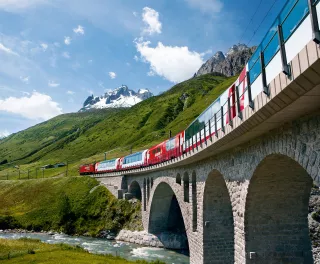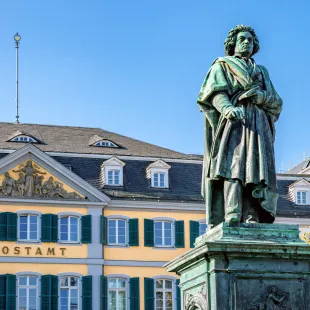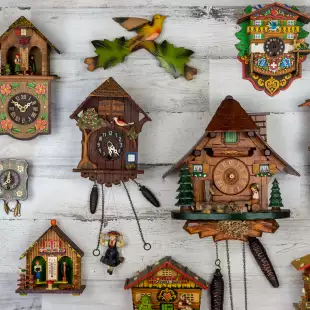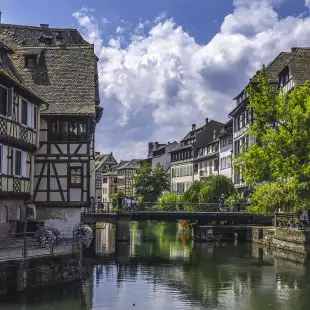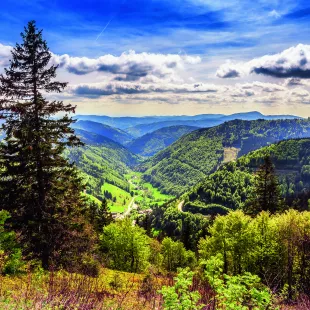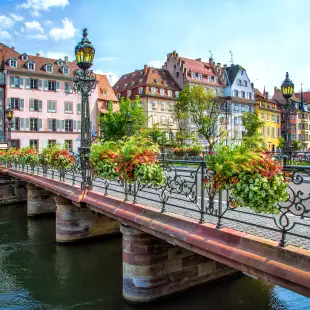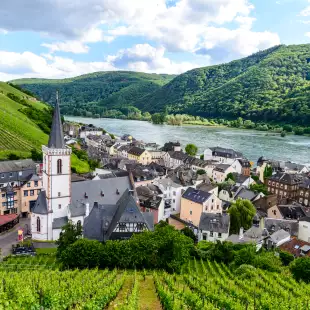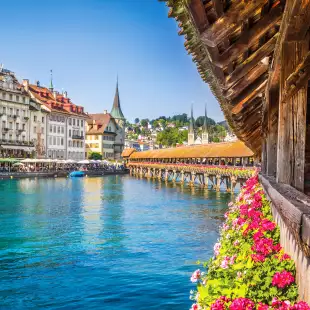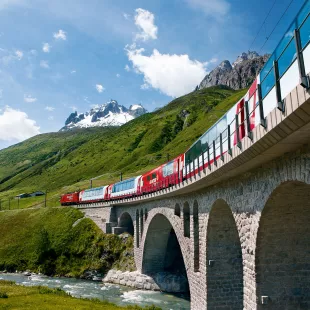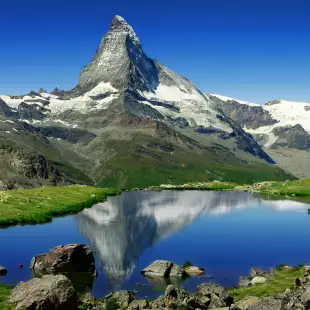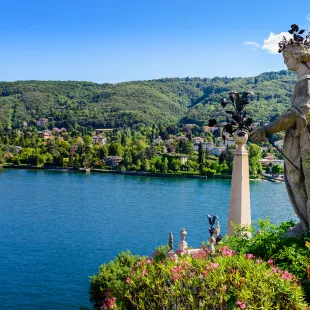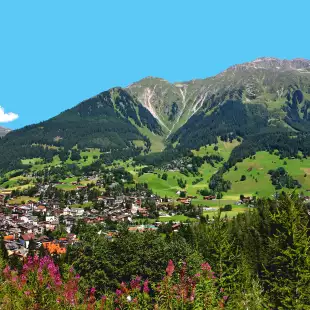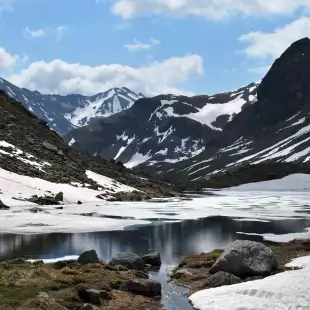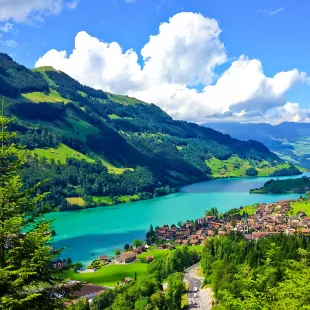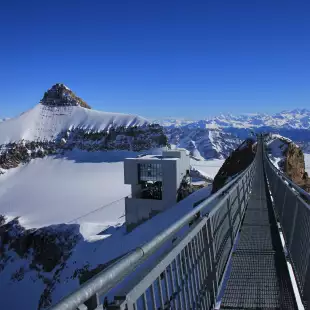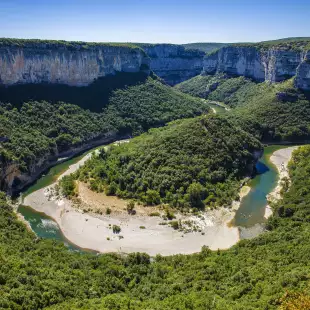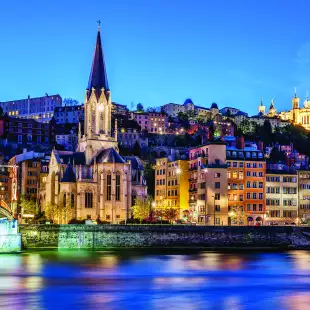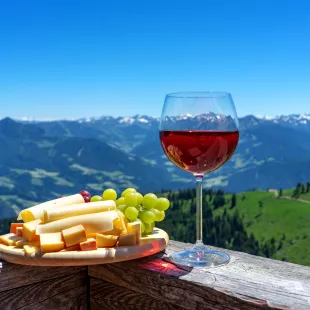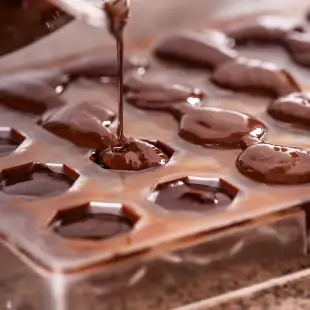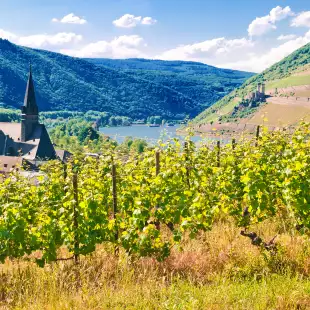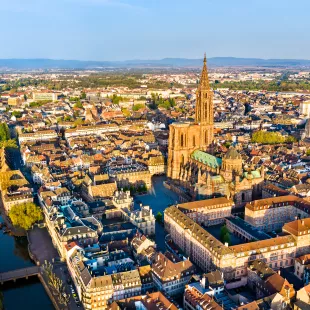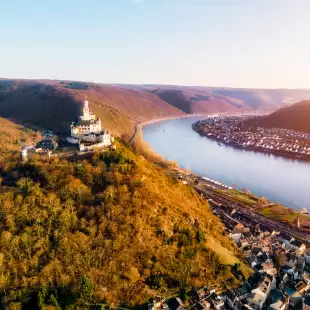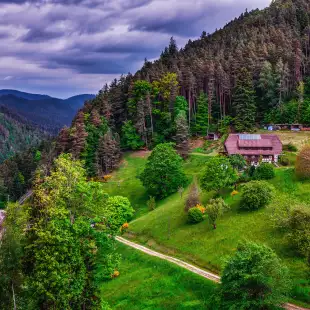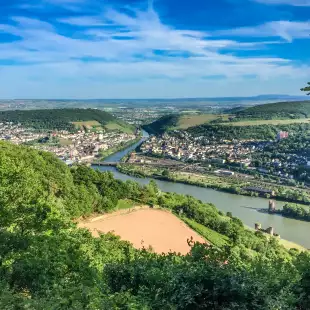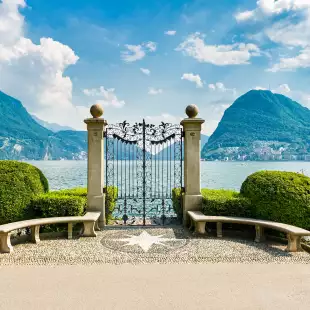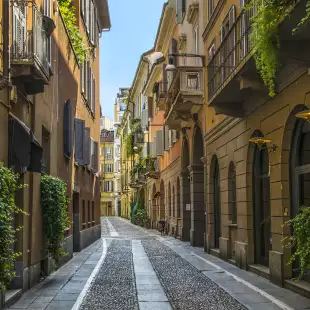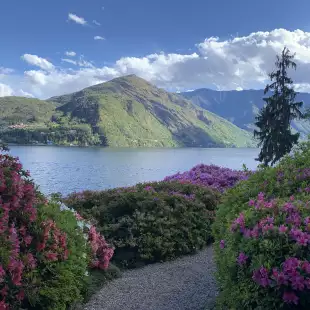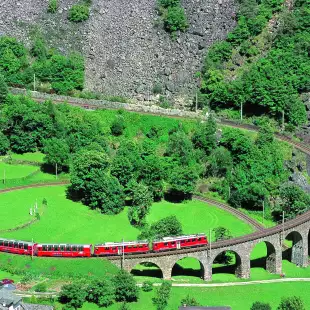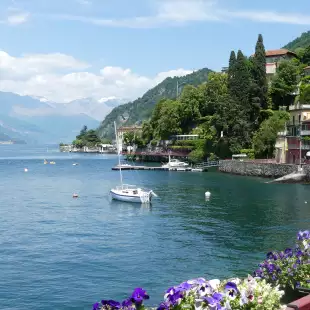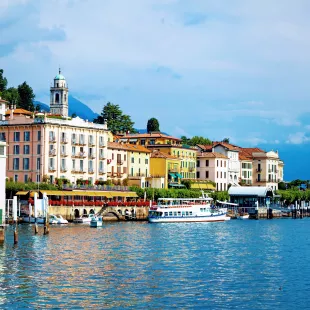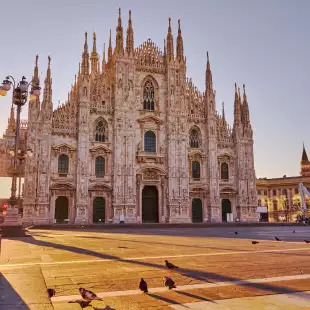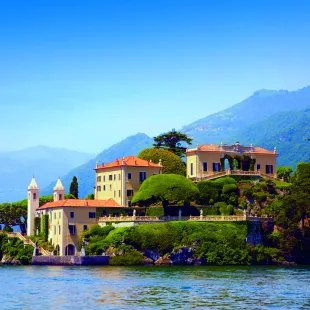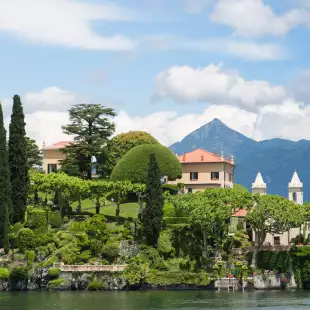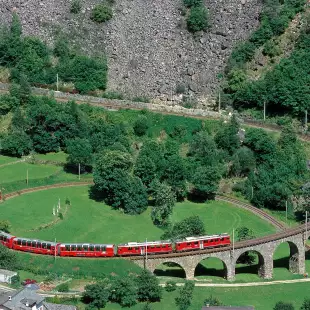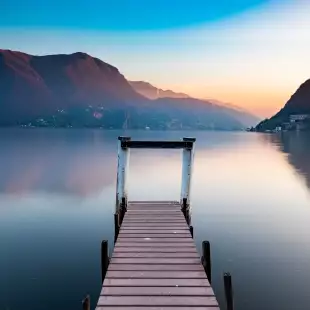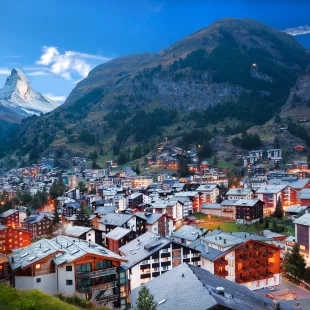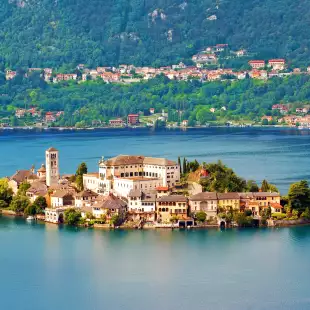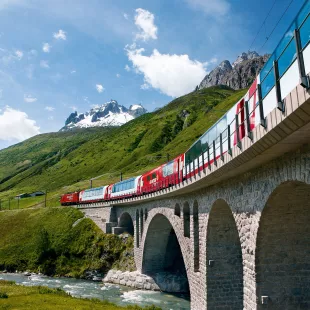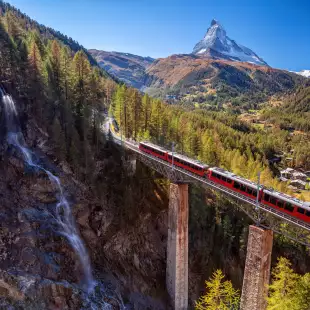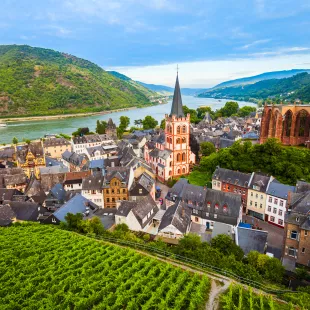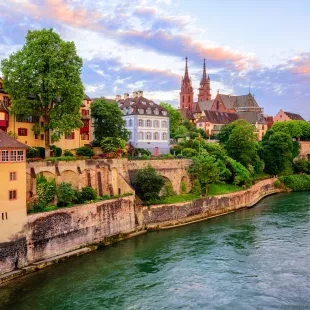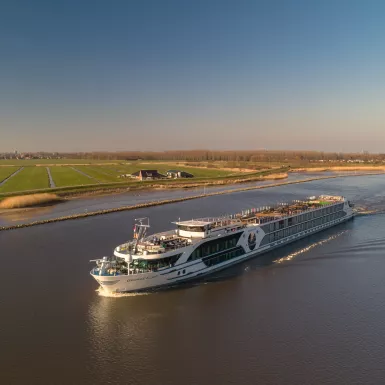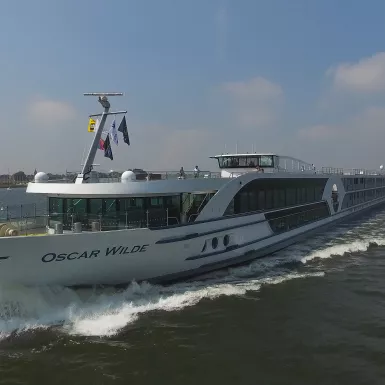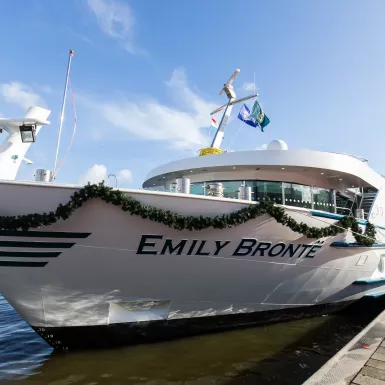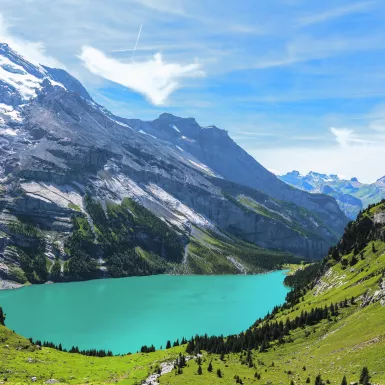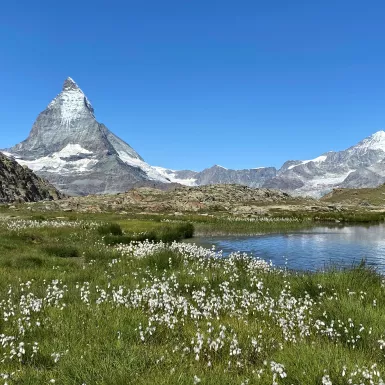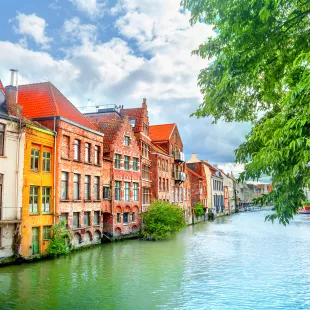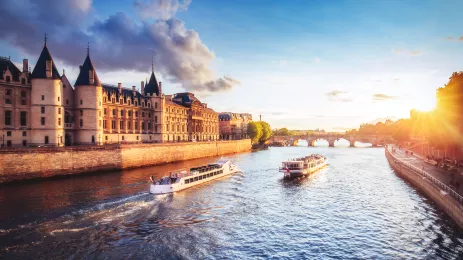Covered in green valleys, beautiful lakes and snowy peaks, Switzerland is known for its rich history and excellent quality of life.
World famous for its stunning landscapes, medieval towns and ever-changing cities, there are plenty of ways to explore this magnificent little country. Perhaps your hearts are set on an adventure through the Swiss mountains and lakes, or you could travel up the Mattertal Valley, gaze at jaw-dropping waterfalls before reaching the summit of the legendary Zermatt for breathtaking views of the Matterhorn. Perhaps you’d prefer to soak in the views on a leisurely cruise onboard a beautiful belle époque style paddle-steamer across Lake Geneva (did we mention lunch on board too?). Then there’s one of the most memorable train journeys Glacier Express, enjoying a four hour trip past spectacular streams and forest-covered hills, reaching heights of 6,700 feet (about twice the height of the Burj Khalifa, the tallest building in the world) at the Oberalp Pass. We can’t not mention food whilst we’re here: indulge in delightful Swiss chocolate or famous cheese dishes (we can’t wait to try fondue neuchâteloise).
Of course, mountains aren’t Switzerland’s only attraction, have you considered a Rhine River cruise? You could meander through the Rhine Gorge in Germany - where the valley walls soar 400m over our heads and the ruins of ancient castles punctuate the riverbanks - on a five-star river cruise vessel before stepping off the ship to explore the likes of Lucerne and Bernese Oberland.
Balanced between inviting cities and awe-inspiring landscapes, there’s no place quite like Switzerland. So, what are you waiting for?
Find your perfect tour
Holiday search form
We've found you 13 holidays in Switzerland
Selecting filter and sort by options will automatically reload the results displayed below.
Filters
Switzerland, the Matterhorn & The Glacier Express Tour Video
Spectacular mountain scenery … the iconic and unmistakeable Matterhorn and dramatic rides on railways - this is Switzerland at its most wonderful.
Popular FAQs
The currency in Switzerland is the Swiss franc – interestingly, it’s also the currency of Liechtenstein and the tiny Campione d'Italia.
Interlaken
The calming atmosphere surrounding Interlaken is a welcome breath of fresh air for any traveller, acting as a brilliant base from which to explore the surrounding mountainous landscape. From here, you can get an intimate look at the world-famous trio of snow-capped peaks – the Jungfrau, Mönch and Eiger. Interlaken is a gateway to the beauty of the Swiss Alps, with two gorgeous azure lakes – Lake Brienz to the east and Lake Thun to the west – which you can gaze out over as you savour the mountainous views. If you feel like getting up a little higher, the Harderkulm observation platform provides a fantastic vantage point where you can watch the evening sun settle into the valleys and illuminate the peaks with golden light.
Zermatt
If you’re looking to change gears and low the pace down, then Zermatt is the perfect place to settle in and get comfy. The whole town is essentially pedestrian only, meaning you can escape the traffic and bask in the quiet, tranquil streets as you explore Zermatt. With enviable views of the Matterhorn peak, this classic Swiss mountain town offers a little romance among the peaks. Zermatt is a year-round favourite with skiers and hikers looking to make the most of the mountainous surroundings and the bounty of panoramic views on offer.
Lucerne
Within the shadows of the Rigi and Pilatus mountains, Lucerne is a particular highlight of the region. The mountain views and lake which shares the city’s name contribute massively to the appeal of Lucerne, considered to be one of Switzerland’s most beautiful cities. The wooden walkway of the Chapel Bridge provides wonderful lakeside views out over the mountains as the centrepiece of the city. Taking a stroll along the walkway with its vibrant floral window boxes is a fantastic way to get a sense of the peace and quiet afforded by the surrounding mountains.
Lake Geneva
Lake Geneva for known for its captivating blend of natural beauty, rich history, and cultural allure. With the stunning backdrop of the Swiss Alps, Lake Geneva offers panoramic lake and mountain views, inviting discerning travellers to explore its tranquil shores and indulge in a myriad of outdoor activities, from leisurely boat cruises to scenic hikes. The region also boasts a wealth of historical landmarks, including the medieval Chillon Castle, which stands as a testament to centuries of European history. Moreover, Lake Geneva's cosmopolitan cities, such as Geneva and Lausanne, exude charm with their vibrant art scenes, gourmet cuisine, and upscale shopping districts, ensuring a memorable and enriching experience for visitors from around the globe.
Travel on the Glacier Express
The Glacier Express is arguably the most spectacular train journey in the world, winding through the Swiss Alps and taking in some truly breath-taking scenery through the large panoramic windows. Visit Switzerland for this amazing journey, which offers incredible views of the iconic Matterhorn, perhaps the most recognisable peak on the planet. The Glacier Express travels across impressively high viaducts, winding around the mountains and through spiral tunnels past cascading waterfalls and forested hillsides. Other highlights of the trip include views of Rhine Gorge, ‘the ‘Grand Canyon of Switzerland’, and passing through the Oberalp mountain pass at 6,700 feet, which connects the cantons of Graubünden and Uri.
Take the cable car to Lake Oeschinen
The pristine waters of Lake Oeschinen are truly a marvel to behold, sat at an elevation of over 1,500 metres above the resort of Kandersteg. By taking a journey up towards the mountain lake via cable car, you have the opportunity to look out over the valleys and mountains for miles on end before reaching a point near the lake itself. A short 30-minute stroll through pine forests and pastures will carry you to the edge of the crystal-clear waters which are bordered by the snowy peaks of the mountains around it.
See the Aletsch Glacier
A UNESCO World Heritage Site, the Aletsch Glacier is the longest in the European Alps, stretching for 23 kilometres, and is one of the most incredible things to do in Switzerland. The Aletsch Glacier can be viewed from its head at Jungfraujoch in the Bernese Oberlans, or from the peaks of the Eggishorn, Bettmerhorn and Moosfluh mountains in Valais. Take a trip on scenic cable cars and enjoy incomparable hikes above the glacier.
Switzerland is located in central Europe with a varied topography. While generally, the country experiences a temperate climate with four distinct seasons, this varies depending on regions and altitude. In the lowlands and cities like Zurich and Geneva, summers are typically warm with average temperatures ranging from 20°C to 25°C - although this can on rare occasions rise to the mid-30°Cs, while winters can be cold with temperatures often dropping below freezing, especially in higher altitudes. The Alpine regions experience cooler temperatures year-round, with colder winters and mild summers. Precipitation levels vary across the country, with higher rainfall in the west and south, while the Alpine regions receive significant snowfall during winter, making them popular destinations for winter sports enthusiasts.
Switzerland is renowned for cheese and chocolate, although not usually at the same time! Swiss cheese is famed around the world, and fondue is probably the most famous Swiss delicacy, made from gruyere, emmentaler, white wine and garlic, and served traditionally with bread cubes. Rösti is also a favourite in Switzerland, a fried potato dish served alongside fried eggs or sausage meat called fleischkäse.
Lovers of baked goods should seek out the bűndnernusstorte, a caramelised nut-filled pastry from the canton of Graubűnden, which is served with tea and coffee, and zopf – a plaited enriched loaf similar to the Jewish bread challah. Visitors to the canton of Bern should sample the Berner platte, a feast of meats and sausages, including smoked beef, pork tongue, spareribs, pork loin and sauerkraut. Bündnerfleisch is another famous Swiss delicacy hailing from the city of Chur. Air dried prime beef is dried in the eaves of a barn or open attic and then carved into wafer thin slices – a must try when visiting the area.
Switzerland has an excellent selection of white wines, most of which are from the Lake Geneva area, and unlike French wines, are best when new. In the German-speaking regions, beer is extremely popular, while the national drink is the potent cherry liqueur kirsch.
Switzerland is renowned for cheese and chocolate, although not usually at the same time! Swiss cheese is famed around the world, and fondue is probably the most famous Swiss delicacy, made from gruyere, emmentaler, white wine and garlic, and served traditionally with bread cubes. Rösti is also a favourite in Switzerland, a fried potato dish served alongside fried eggs or sausage meat called fleischkäse.
Lovers of baked goods should seek out the bűndnernusstorte, a caramelised nut-filled pastry from the canton of Graubűnden, which is served with tea and coffee, and zopf – a plaited enriched loaf similar to the Jewish bread challah. Visitors to the canton of Bern should sample the Berner platte, a feast of meats and sausages, including smoked beef, pork tongue, spareribs, pork loin and sauerkraut. Bündnerfleisch is another famous Swiss delicacy hailing from the city of Chur. Air dried prime beef is dried in the eaves of a barn or open attic and then carved into wafer thin slices – a must try when visiting the area.
Switzerland has an excellent selection of white wines, most of which are from the Lake Geneva area, and unlike French wines, are best when new. In the German-speaking regions, beer is extremely popular, while the national drink is the potent cherry liqueur kirsch.
It's not required but appreciated. It's common in Switzerland to round up to the nearest 1, 5 or 10 Swiss Franc when tipping.
Christianity is the most popular religion in Switzerland with 35% of the population identifying as Roman Catholic, 23% as Reformed Protestant and 7% belonging to other Christan groups, 5% identified as Muslim and around 28% signified they have no religious affiliation.
